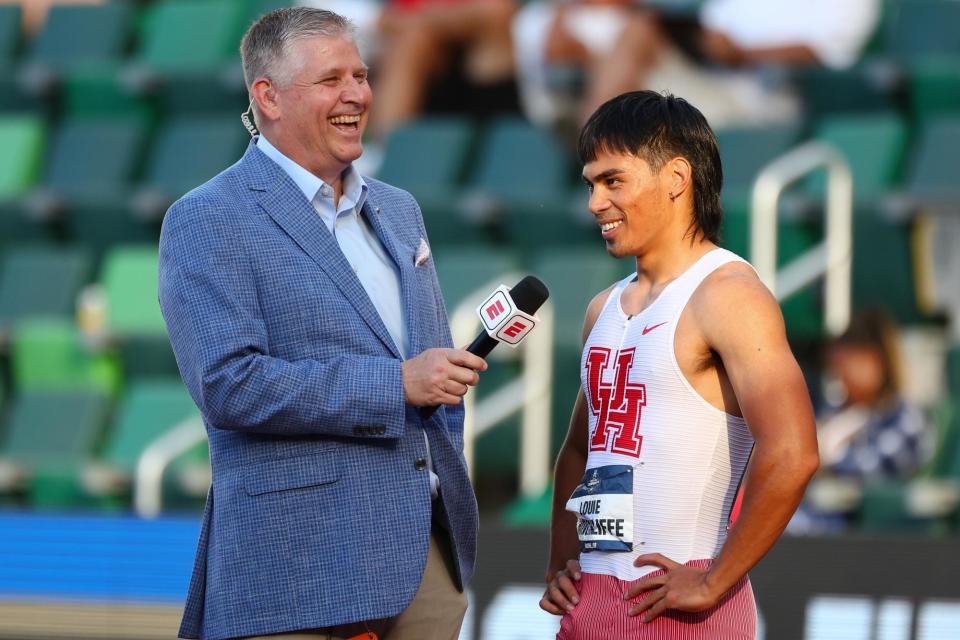Could Louie Hinchliffe be Team GB’s breakout Olympic athletics star?

As the British team bid arrivederci to Rome, and turned their sights towards July’s Olympics in Paris, the mood was cautiously upbeat. True, no one in the squad lit up the Eternal City with a performance for the ages. But 13 medals were won, and the biggest names delivered when their backs were against the wall.
The way Dina Asher-Smith ran a sub 11-second 100m, after the worst start of her career, to win individual gold left a lingering impression. Keely Hodgkinson also deserves enormous credit for rising from her sickbed and using her street smarts to retain her 800m title. There is also a growing sense that the women’s 4x100m squad – Asher-Smith, Amy Hunt, Desiree Henry, Asha Phillip and Daryll Neita – could do something special at the Stade de France.
Related: Warner-Judd provisionally diagnosed with epilepsy after mid-race seizure
Meanwhile, even those who left the Italian capital with a less shiny medal than they expected – such as Neita in the women’s 200m and Molly Caudery in the pole vault – promised it would fuel them in Paris. Yet before the Olympic trials in Manchester in a fortnight’s time, there was also a feeling the real breakout star of the past week didn’t emerge in Rome at all – but nearly 6,000 miles away in Eugene, Oregon.
That athlete was the 21-year-old student Louie Hinchliffe, who ran a startling 9.95sec to take the prestigious NCAA college title in the US – and establish himself as a hugely intriguing wildcard. Darren Campbell, the UK Athletics sprint coach, was certainly impressed with what he saw, calling him a “special talent”.
“It’s been crazy,” says Campbell, when asked about the way Hinchliffe has improved his personal best from 10.17 since moving to train with former Olympic champion Carl Lewis in Houston last year. “But it’s the talk among everybody, with messages flying around.”
Campbell also remembers being deeply impressed when Hinchliffe ran 10.00sec earlier this summer. “You see his time and go, ‘OK, that’s an unbelievable time,” he says. “Then he takes it to the next level. That’s real quality.”
Campbell reveals he sounded out Hinchliffe to run the 4x100m relay in Rome – and, while he was keen, his sights were instead set on qualifying for the NCAAs. “Obviously he then ran 10 flat and qualified. That’s when we properly knew this guy is a special talent.
But Hinchliffe won’t face an easy task at the 100m trials, given he has already had a long season and will face Zharnel Hughes, Jeremiah Azu, Eugene Amo-Dadzie, Reece Prescod and CJ Ujah, who have all gone under 10 seconds too.
“It’s going to be electric,” says Campbell, who believes this is the strongest ever era of British men’s sprinting. “I think it’s better than my era if I’m totally honest,” he says. “Imagine a trials where four guys go sub-10 if the conditions are right? That’s crazy.”
He insists the high level of competition will make British men’s sprinting even stronger. “From the moment I came in that’s all I ever wanted to do, bring back the days I remember,” he says. “That’s what spurred me on, the likes of Dwain Chambers, Christian Malcolm, Jason Gardener, Mark Lewis-Francis and Marlon Devonish. I’d go to the trials and I knew I had to raise my game. Iron sharpens iron. That’s what we’ve been trying to build since the very beginning.
“I think this will be one of the most competitive and exciting British Olympic trials ever. That’s what the sport needs. You’ve got to have competition at home if you want to be successful in the world.”
Campbell also praised Asher-Smith for the way she delivered in Rome – and predicted she could win an Olympic medal in Paris. “This sport is about finding a way to win,” he says. “I think we’ve all maybe got used to Dina getting the best start and getting out there. Against the best in the world you’ve got to find a way to win. I thought that was such a quality performance and showed the level and quality of her experience. The pressure she just didn’t process. She could have got tight but she never stopped believing.”
Campbell credited Asher-Smith with being brave enough to move to Texas last October to revitalise her career after a disappointing world championships last summer. “What Dina is doing is exceptional,” he says. “To move to a new coach and new environment on the other side of the world and figure it out bodes well. She’ll be focused on winning an Olympic medal. Come an Olympic final everyone gets nervous and you have to find a way to win. And she’s shown she is in great shape.”

